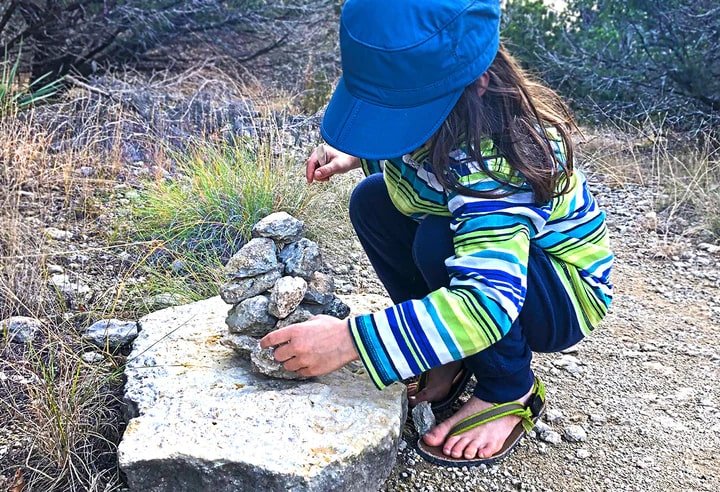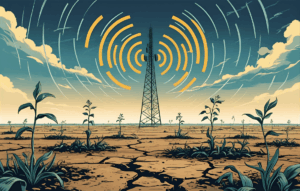Nature has always been an integral part of human existence. It actually feels kind of silly writing that, because nature is the most real and genuine part of our world that there is. Everything outside of nature is manufactured by mankind, yet for a large population of people, that is their “real world”. For most of our history, humans have lived in close contact with nature, relying on it for food, shelter, and protection. However, in recent times, we have become increasingly disconnected from the natural world. Many people now live in urban environments, spending most of their time indoors, and surrounded by technology. This disconnection from nature has been linked to various mental and physical health problems. In this blog, we will explore how being in nature is good for our mental and physical health and the science behind those claims.

Mental Health Benefits of Being in Nature
Spending time in nature has long been recognized as a way to reduce stress and promote relaxation. However, research over the years has revealed that being in nature has numerous benefits for our mental health. From reducing symptoms of depression and anxiety to improving cognitive function and creativity, the benefits of being in nature are far-reaching. In this blog, we’ll delve into the science behind the mental health benefits of being in nature and explore some of the latest research in this area.
Enhancing self-esteem & resilience while eliminating anxiety & depression: Research suggests that spending time in nature can enhance self-esteem and resilience. For example, research conducted by Barton and Pretty in 2010 found that green exercise, which involves physical activity in natural environments, led to significant improvements in self-esteem among participants. Another study investigated the effects of a wilderness therapy program on self-esteem, resilience, and other psychological outcomes among at-risk youth. The participants spent 6 to 8 weeks in the wilderness, engaging in activities such as backpacking and rock climbing. The results showed significant improvements in self-esteem and resilience among the participants, as well as other positive psychological outcomes such as improved emotional regulation and decreased symptoms of depression and anxiety. The study suggests that nature exposure can be a powerful intervention for improving mental health and well-being, particularly among at-risk populations. Studies have consistently found that spending time in nature can help reduce symptoms of depression and anxiety. Lastly, a 2015 meta-analysis of 10 studies found that exposure to natural environments was associated with a significant reduction in symptoms of depression.
Improving cognitive function & creativity: Spending time in nature has been shown to improve cognitive function, including attention, memory, and creativity. For example, a study found that a 50-minute walk in a natural environment led to significant improvements in cognitive performance, compared to a walk in an urban environment. Another research study found that a four-day backpacking trip led to improvements in creativity and problem-solving abilities among participants. These studies suggest that exposure to natural environments can provide a cognitive boost, potentially due to reduced mental fatigue and increased exposure to stimuli that promote attention restoration.
Lowering stress: Studies have shown that spending time in nature can significantly lower stress levels. For example, a study in 2015 found that participants who went on a 90-minute walk in nature showed reduced activity in the prefrontal cortex, an area of the brain associated with rumination and negative thought patterns. Additionally, a 2010 study investigated the effects of a forest therapy program on cortisol levels and other physiological and psychological measures in male workers. The participants spent two nights and three days in a forest, engaging in various activities such as hiking and meditation. The results showed that cortisol levels significantly decreased after the forest therapy program, indicating a reduction in stress levels. The study also found improvements in various psychological measures, such as mood and subjective well-being, further supporting the idea that nature exposure can have positive effects on mental health.
Overall, the mental health benefits of being in nature are numerous and far-reaching. From reducing symptoms of depression and anxiety to improving cognitive function and creativity, spending time in nature can have a positive impact on our mental health and well-being. As we continue to face a global mental health crisis, it’s important to remember the healing power of nature and to incorporate it into our daily lives whenever possible.
Physical Health Benefits of Being in Nature
Improved immune function: Being in nature has even been shown to improve immune function. Research has shown that exposure to nature can increase the activity and number of natural killer cells, which are an important part of the immune system that helps the body fight off viruses and cancer cells. Additionally, spending time in nature has been shown to reduce stress, which can also have a positive impact on immune function.
One study published in the International Journal of Immunopathology and Pharmacology found that individuals who spent time in a forest had an increase in natural killer cell activity, as well as a decrease in levels of the stress hormone cortisol. Another study published in the journal Environmental Health and Preventive Medicine found that spending time in a forest increased the production of anti-cancer proteins and enhanced the activity of natural killer cells.
Overall, spending time in nature can have numerous positive effects on immune function, and may even help to reduce the risk of certain diseases. So next time you’re feeling under the weather, consider taking a walk in the park or spending some time in the great outdoors!
Improved blood pressure: Another benefit of being surrounded by nature is its positive impact on blood pressure. Several studies have shown that being in natural environments, such as parks, forests, and beaches, can significantly reduce blood pressure levels in individuals with hypertension or prehypertension.
According to a systematic review and meta-analysis published in the International Journal of Environmental Research and Public Health, spending time in nature can lead to a reduction in both systolic and diastolic blood pressure. The review analyzed data from 17 studies involving 876 participants and found that spending time in green spaces for at least 30 minutes per week can reduce systolic blood pressure by an average of 2.82 mmHg and diastolic blood pressure by an average of 1.24 mmHg. These findings suggest that nature-based interventions can be an effective strategy for managing hypertension.
Being surrounded by the natural environment of this world can have a significant positive impact on blood pressure levels, making it a potentially effective intervention for managing hypertension.
Improved sleep: Research has shown that exposure to natural environments can improve sleep duration, quality, and even the ability to fall asleep. One study in 2015 aimed to investigate the relationship between nature exposure and sleep quality in a sample of college students. The researchers found that participants who reported spending more time in natural environments had better sleep quality and lower levels of sleep-related disturbances. The study also found that individuals who reported higher levels of stress benefited more from nature exposure in terms of sleep quality.
Another study investigated the effects of a week-long camping trip on participants’ sleep patterns and circadian rhythms. The researchers found that exposure to natural light and darkness during the camping trip resulted in a shift in participants’ sleep-wake cycles to better align with natural daylight and darkness. This shift was accompanied by an increase in melatonin levels, the hormone that regulates sleep. The study suggests that exposure to natural light and darkness can help reset our internal clocks and improve our sleep patterns.
The benefits of nature on sleep have been linked to a variety of factors, including reduced exposure to artificial light, increased exposure to natural light, and decreased levels of noise pollution. As mentioned before, spending time in nature has been shown to decrease levels of cortisol, the hormone associated with stress, which can disrupt sleep patterns. If you’re looking to improve your sleep, consider spending more time in green spaces or even going camping.
Counteracts the negative effects of EMF (especially when grounded): Last but certainly not least, being in nature helps mitigate the negative effects of electromagnetic fields (click here to read my blog about EMFs). While EMF exposure is almost inescapable, even in the forest, it amazes me how nature finds a way to heal us. This is especially true while grounding, which has been said to completely eliminate all EMFs from our body within minutes (click here to read my blog on grounding).
Want to know my favorite combination when outdoors? Wearing EarthRunners grounding sandals allows me to adventure on a hiking trail, ground myself electrically, and connect with the Earth’s healing frequency. Some real hippy-dippy-trippy stuff, but hey, it works…use code KYLETOTHEMOON to get 10% off your EarthRunners grounding sandals.
To close it out, I’ll mention just one additional research study published in the Journal of Environmental Health Science and Engineering that found that exposure to natural environments can reduce oxidative stress caused by EMF exposure. Oxidative stress is a common mechanism underlying the negative effects of EMF radiation on human health. The study suggests that exposure to natural environments can help reduce oxidative stress, which may help counteract the harmful effects of EMF exposure.
Conclusion
Being in nature is good for our mental and physical health. Spending time in nature can reduce stress, improve mood, reduce symptoms of depression, increase creativity, and improve cognitive function. Being in nature can also improve immune function, lower blood pressure, improve cardiovascular health, improve sleep, and increase physical activity. These benefits are well-documented by numerous studies and research papers.
If you’re feeling overwhelmed or stressed, consider spending some time in nature. Take a walk in the park, go for a hike, or simply sit outside and enjoy the beauty of the natural world. You’ll be amazed at how much better you feel. In conclusion, it’s clear that nature has won as the number one outlet for physical and mental health benefits, and it’s important to make time for it in our busy lives.
Have an opinion you want to share? Think I’m crazy? Want to ask a question? Please, feel free to leave a comment and begin a dialogue in the comments sections below!

















